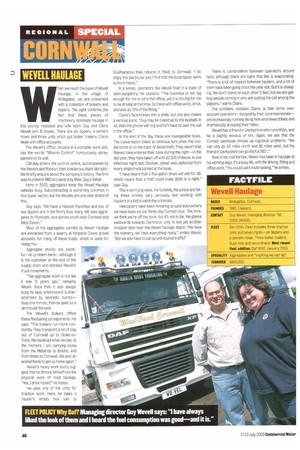WE YELL HAULAGE
Page 46

If you've noticed an error in this article please click here to report it so we can fix it.
11IV hen we reach the base of Wevell
Haulage, in the village of Widegates, we are presented with a collection of bulkers and tippers. The sight confirms the fact that these pieces of machinery dominate haulage in this county. Husband and wife team Guy and Claire Wevell own 10 trucks. There are six tippers, a cement mixer and three units which pull bulker trailers. Claire deals with office accounts.
The Wevell's office, housed in a portable work unit, has the words "Mission Control" humourously spraypainted on its wall.
CM duly enters the control centre, accompanied by the Wevells and Robson, their boisterous black labrador. We briefly enquire about the company's history. The firm was founded in 1960 in Liskeard by Mike, Guy's father.
Here in 2003, aggregates keep the Wevell Haulage vehicles busy. Subcontracting is extremely common in this tipper sector, but the Wevells are one step ahead of this.
Guy says: "We have a Hanson franchise and two of our tippers are in the firm's blue livery. We take aggregates to Plymouth, and across south-east Cornwall and West Devon."
Most of the aggregates carried by Wevell Haulage are extracted from a quarry at Hingston Down; gravel accounts for many of these loads, which is used for ready mix.
Aggregate stocks are plentiful—no problem here—although it is the customer at the end of the supply chain who dictates Wevell's truck movements.
"The aggregate work is not like it was 15 years ago," remarks Wevell. Back then it was always busy, he says, where now it is characterised by sporadic bursts— busy one minute, then as quiet as a dormouse the next.
The Wevell's bulkers offset these fluctuating consignments. He says: "The bulkers run more constantly. They transport a lot of clay out of Cornwall up to Stoke-onTrent. We backload what we can; at the moment, I am carrying stone from the Midlands to Bristol, and from Wales to Cornwall. We also do animal feeds to get us home again."
Wevell's heavy work boots suggest that he throws himself into the physical work of road haulage. "Yes, !drive myself," he states.
He uses one of the units for traction work. Here, he takes a haulier's empty box van to Southampton then returns it, filled, to Cornwall. "I do enjoy this particular job; I find that the local tipper work is more manic."
In a sense, operators like Wevell float in a state of semi-purgatory. He explains: "The business is not big enough for me to sit in the office, yet it is too big for me to be driving all the time. So I deal with office work, drive, and also do 75% of the fitting."
Claire's face breaks into a smile, but she also makes a serious point. "Guy may be caked up to the eyeballs in oil, then the phone will ring and he'll have to take the call in the office."
At the end of the day, these are manageable tasks. The conversation takes an ominous turn when the couple come on to the topic of diesel theft. They report that thieves have entered their base during the night—in the last year, they have taken off with £2,500 of diesel. In one infamous night last October, diesel was siphoned from every single truck parked at the base.
"I have heard that a five-gallon drum will sell for £8, which means that a thief could make £640 in a night," says Guy.
This is worrying news. Fortunately, the police are taking these crimes very seriously and working with hauliers in a bid to catch the criminals.
Helicopters have been hovering around everywhere we have been on our three-day Cornish tour. This time, we think we're off the hook; but it's not to be. We glance eastwards towards Dartmoor, only to see yet another chopper land near the Wevell haulage depot. "We have the scenery, we have everything really," smiles Wevell. "But we also have to put up with tourist traffic!" There is camaraderie between operators around here, although there are signs that this is evaporating. "There is a lot of respect between hauliers, and a lot of them have been going since the year dot. But it is changing. We don't stand on each other's feet, but we are getting people coming in who are putting the cat among the pigeons," warns Claire.
The problem, explains Claire, is that some ownaccount operators—buoyed by their core businesses— are increasingly running along hire-and-reward lines and dramatically dropping their rates.
Wevell has a friend in Derbyshire who runs HGVs, and he is slightly envious of him. Again, we see that the Cornish peninsula throws up logistical problems. "We can only go 60 miles north and 90 miles west, but my friend in Derbyshire can go the full 360°."
Now in his mid-thirties, Wevell has been in haulage all his working days. It's a busy Ile, with the driving, fitting and office work. "You could call it multi-tasking," he smiles.
















































































































































































